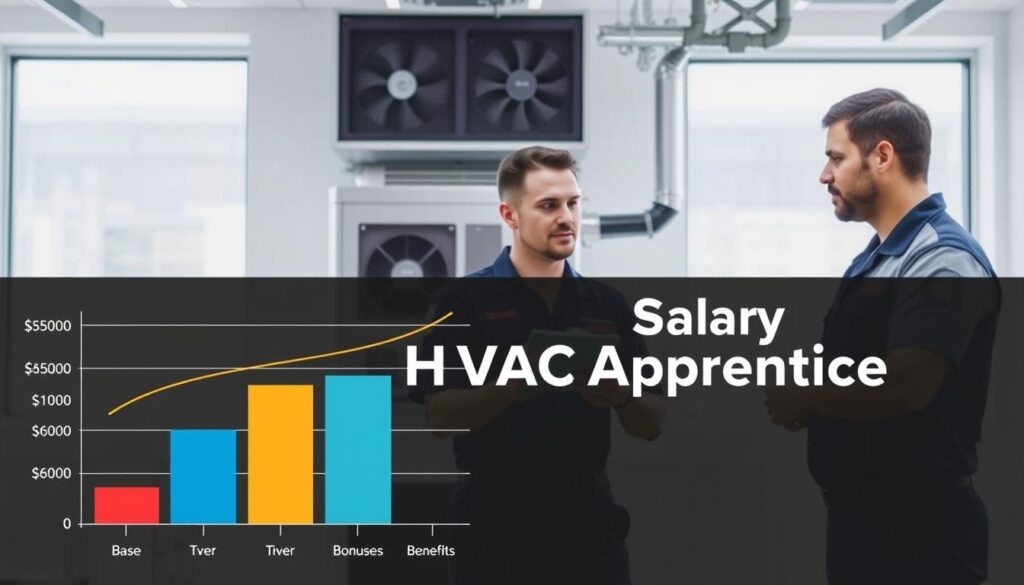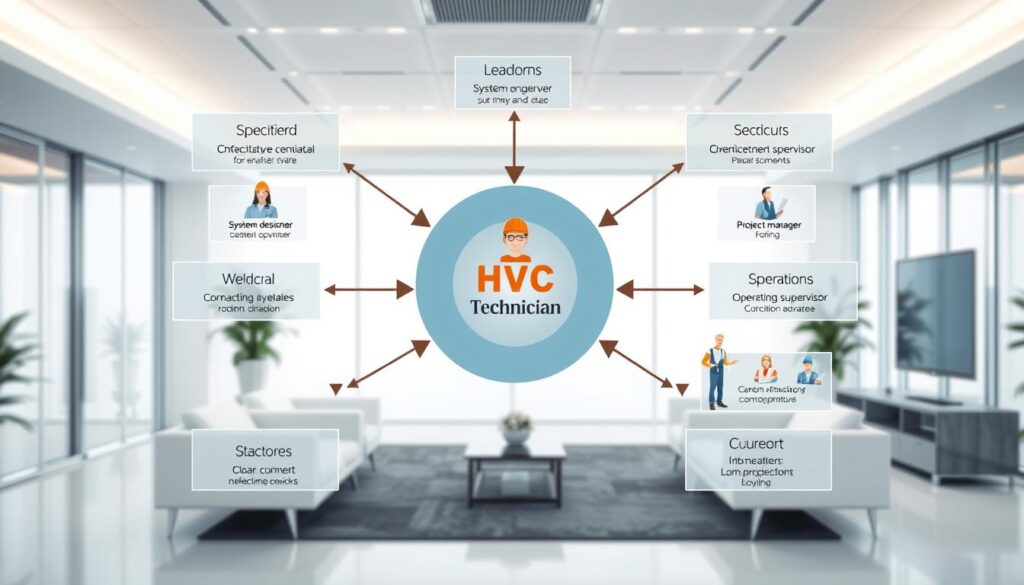Affiliate Disclosure
HVAC Guide Guys is a participant in the Amazon Services LLC Associates Program, an affiliate advertising program designed to provide a means for sites to earn advertising fees by advertising and linking to Amazon.
How to Become an HVAC Apprentice? The HVAC industry is a great choice for those looking for a technical job. It’s growing fast, with lots of chances to advance. Learning to be an HVAC apprentice is a smart move.

Are you ready for a career that’s stable, growing, and hands-on? Starting in HVAC could be your big break.
This guide will show you how to start your HVAC career. We’ll cover education, apprenticeships, and more. You’ll get the advice you need to make your career dreams come true.
Key Takeaways
- HVAC careers offer excellent job stability and growth potential
- Apprenticeships provide structured training and real-world experience
- Technical skills and problem-solving abilities are crucial
- Multiple pathways exist for entering the HVAC profession
- Certification and continuous learning are essential for success
Table of Contents
Understanding the HVAC Apprenticeship Path
Exploring a career in HVAC opens doors to a dynamic and rewarding profession. The heating, ventilation, and air conditioning industry offers stable employment and exciting opportunities. Those willing to invest in their skills and training will find it rewarding.
What is an HVAC Apprenticeship Program
An HVAC apprenticeship program provides structured training. It combines classroom instruction with hands-on work experience. These programs usually last 3-5 years, allowing you to earn while you learn.
The hvac apprenticeship requirements include:
- High school diploma or equivalent
- Minimum age of 18
- Strong mathematical and mechanical skills
- Physical fitness for technical work
Benefits of Choosing HVAC as a Career
Selecting an HVAC career brings numerous advantages for your professional growth. The hvac job qualifications make this field attractive to many aspiring technicians.
| Career Benefit | Description |
|---|---|
| Job Stability | Essential services always in demand |
| Competitive Salary | Median annual wage of $57,300 |
| Career Advancement | Opportunities to specialize or become a business owner |
Industry Growth and Job Outlook
The HVAC industry continues to expand, with projected job growth faster than many other trades. Technological advancements and increasing focus on energy efficiency drive demand for skilled professionals.
- Projected job growth: 5% annually
- Increasing demand for sustainable heating and cooling solutions
- Opportunities in residential, commercial, and industrial sectors
Basic Educational Requirements and Prerequisites
Starting your HVAC journey means knowing the basic educational needs. Most hvac training programs need a strong educational base. This prepares you for the technical challenges you’ll face.
Getting a high school diploma or GED is your first goal. These are the basics for entering good hvac trade school programs and apprenticeships.
- High school diploma or equivalent (GED)
- Basic mathematics skills
- Fundamental understanding of physics and science
- Strong problem-solving capabilities
Being technically ready is key for HVAC success. Many trade schools offer special courses. These courses help you move from classroom learning to real-world skills.
| Educational Requirement | Typical Expectations |
|---|---|
| Minimum Education | High School Diploma/GED |
| Recommended Courses | Mathematics, Physics, Technical Drawing |
| Additional Certifications | Trade School Technical Programs |
Physical fitness is also important in HVAC apprenticeships. You must be able to lift heavy equipment and work in tough environments. You also need to stay physically strong during long workdays.
Some employers and apprenticeship programs might ask for more. This includes a valid driver’s license, a clean background check, and basic mechanical skills.
Explore Our HVAC Shop
Looking for top-rated HVAC tools, parts, and accessories? Visit our shop and find the perfect solution for your needs.
Visit the ShopHow to Become an HVAC Apprentice
Starting your HVAC career needs careful planning and knowing the right steps. Whether you’re looking for an HVAC apprenticeship near you or want to know how to become one, this guide will help. It will show you the key steps to follow.
Finding Apprenticeship Opportunities
Finding the right apprenticeship takes several steps:
- Contact local trade unions specializing in HVAC
- Check online job boards like Indeed and ZipRecruiter
- Reach out directly to HVAC companies in your area
- Explore community college career centers
- Attend vocational job fairs
Application Process
Creating a strong application is key for HVAC apprentices. Most programs need a detailed approach:
- Research potential apprenticeship programs
- Verify minimum age requirements (typically 18)
- Prepare a professional resume highlighting technical skills
- Schedule preliminary interviews
- Complete mandatory aptitude tests
Required Documentation
To apply for an HVAC apprenticeship, you’ll need these documents:
- High school diploma or GED certificate
- Proof of age verification
- Valid government-issued identification
- Academic transcripts
- Letters of recommendation
Pro Tip: Start preparing documentation early to streamline your apprenticeship application process.
By taking these steps, you’ll be ready to start your HVAC apprenticeship journey. This will help you build a strong career in this exciting field.
Explore Our HVAC Shop
Looking for top-rated HVAC tools, parts, and accessories? Visit our shop and find the perfect solution for your needs.
Visit the ShopHVAC Apprenticeship Duration and Training Structure
Starting hvac training programs means knowing the duration and structure is key for success. HVAC apprenticeships last 3 to 4 years. They mix hands-on experience with classroom learning.
Your apprenticeship is a journey of growth. It combines practical skills with theory. This makes you a complete HVAC expert.
Program Breakdown
- Total apprenticeship duration: 3-4 years
- Annual on-the-job training: Approximately 2,000 hours
- Annual classroom instruction: Around 144 hours
The training is designed to improve your skills step by step. You’ll learn basic skills first and then move to harder tasks.
| Apprenticeship Year | Focus Area | Key Learning Objectives |
|---|---|---|
| Year 1 | Fundamental Skills | Safety protocols, basic tool usage, system components |
| Year 2 | Technical Knowledge | Advanced system diagnostics, refrigeration principles |
| Year 3-4 | Specialized Training | Complex installations, troubleshooting, energy efficiency |
As you move through your training, you’ll get better at working with different HVAC systems. You’ll learn through hands-on work and classes.
Your apprenticeship is more than just a job—it’s a comprehensive pathway to becoming a skilled HVAC professional.
Essential Skills and Qualifications for Success
To be a top HVAC apprentice, you need more than just technical skills. Your qualifications will cover a wide range of abilities. Employers look for people who can do well in both technical and social parts of the job.
Starting your HVAC career means having a mix of technical skills, personal traits, and physical strength. Knowing what employers want can help you shine in a tough field.
Technical Abilities That Matter
Being good at technical skills is key for HVAC success. You should know how to:
- Understand basic electrical systems
- Diagnose mechanical systems
- Read blueprints
- Do math calculations
- Use computers
Critical Soft Skills
Just knowing technical stuff isn’t enough. HVAC pros also need great soft skills:
- Being able to communicate clearly
- Being good at solving problems
- Providing excellent customer service
- Working well with others
- Managing your time well
Physical Requirements
The HVAC world needs people who are physically strong. You’ll need to:
| Physical Requirement | Description |
|---|---|
| Strength | Be able to lift over 50 pounds |
| Mobility | Feel comfortable in tight spots |
| Endurance | Stand or walk for a long time |
| Flexibility | Be able to climb ladders and work in different positions |
By working on these skills, you’ll be a strong candidate in the HVAC field.
Explore Our HVAC Shop
Looking for top-rated HVAC tools, parts, and accessories? Visit our shop and find the perfect solution for your needs.
Visit the ShopHVAC Apprentice Salary and Compensation

Knowing how much an HVAC apprentice makes is key for those thinking about this career. At first, apprentices earn less than skilled technicians. This is because they are still learning.
The average salary for an HVAC apprentice is $26,000 to $43,000 a year. Most make about $16.38 an hour. As you get better and gain experience, your pay will go up.
Factors Influencing HVAC Apprentice Salary
- Geographic location
- Company size and type
- Union vs. non-union apprenticeship
- Individual performance
Many things affect how much an HVAC apprentice makes. Places with high demand for HVAC services usually pay more.
| Experience Level | Typical Annual Salary | Hourly Rate |
|---|---|---|
| First Year Apprentice | $26,000 – $32,000 | $14 – $16 |
| Second Year Apprentice | $32,000 – $38,000 | $16 – $18 |
| Third Year Apprentice | $38,000 – $43,000 | $18 – $22 |
Apprentices also get extra benefits like:
- Tool allowances
- Health insurance
- Overtime pay opportunities
- Retirement plans
As you move up in your apprenticeship, your earnings will rise a lot. Investing in your skills can lead to a rewarding and stable HVAC career.
Certification and Licensing Requirements
Understanding the certification process is key for HVAC technicians. Getting certified shows you’re skilled and serious about your work. It opens up more job chances and helps you move up in your career.
To become a certified HVAC technician, you need to get several important certifications. Knowing what these are helps you plan your career path well.
EPA Section 608 Certification
The EPA Section 608 Certification is a must for HVAC techs who handle refrigerants. It comes in four types:
- Type I: Small Appliances
- Type II: High-Pressure Appliances
- Type III: Low-Pressure Appliances
- Universal: Covers All Appliance Types
State-Specific Requirements
Each state has its own rules for HVAC techs. Your path to certification depends on these local laws. They usually include:
- Minimum work experience hours
- Passing a state-specific exam
- Background check
- Proof of educational credentials
Additional Certifications
You can also get special certifications to make yourself stand out:
| Certification | Issuing Organization | Focus Area |
|---|---|---|
| NATE Certification | North American Technician Excellence | Technical Competence |
| HVAC Excellence | Professional Testing Institute | Advanced Skills |
| R-410A Certification | EPA Approved | Refrigerant Handling |
“Continuous learning and certification are the keys to success in the HVAC industry.” – HVAC Professional Magazine
Getting certified shows you’re dedicated to your work and the industry’s standards. Keep up with these requirements as you grow in your career.
Explore Our HVAC Shop
Looking for top-rated HVAC tools, parts, and accessories? Visit our shop and find the perfect solution for your needs.
Visit the ShopCareer Advancement Opportunities

Starting an HVAC career is exciting. Your first step, an apprenticeship, is just the beginning. It leads to many advanced paths in the heating, ventilation, and air conditioning field.
As you move forward, you’ll find several great ways to grow:
- Specialized Technician Roles
- Commercial HVAC Systems Expert
- Residential Installation Specialist
- Energy Efficiency Consultant
- Management Positions
- Service Team Supervisor
- Operations Manager
- Technical Department Head
- Entrepreneurial Opportunities
- Starting Your Own HVAC Business
- Consulting Services
- Equipment Sales and Distribution
Continuous learning is crucial for career advancement in HVAC. Keeping up with new tech, getting more certifications, and improving your skills are key. They boost your career growth.
Many HVAC pros say networking and going to industry events are important. They also suggest advanced training to learn more. Your dedication to learning will help you get better jobs and earn more.
Union vs Non-Union Apprenticeships
When you look into HVAC apprenticeships, you’ll find two main paths: union and non-union. Knowing the differences between these can help you choose the right career path.
Union apprenticeships offer structured training with set benefits and wages. They provide:
- Comprehensive healthcare coverage
- Guaranteed wage scales
- Strong job protection
- Extensive networking opportunities
Non-union apprenticeships offer a more flexible way to learn HVAC. They allow for:
- More diverse work experiences
- Potential faster career advancement
- Varied training schedules
- Direct employer relationships
| Aspect | Union Apprenticeships | Non-Union Apprenticeships |
|---|---|---|
| Training Consistency | Highly Standardized | Varies by Employer |
| Wage Structure | Negotiated Rates | Employer-Determined |
| Job Security | Strong Protection | Dependent on Individual Employer |
Your choice between union and non-union apprenticeships depends on your career goals and what you want from your job. Think about your long-term goals in the HVAC industry.
Conclusion
Becoming an HVAC apprentice is a great start to a rewarding career. You’ve learned the steps to start your HVAC journey. From education to apprenticeships, you know what to do next.
The HVAC industry is stable, offers good pay, and has ongoing learning. With new tech, skilled workers are always needed. Your dedication to learning will help you succeed in this field.
Getting hands-on experience and technical skills is crucial. Whether you join a union or not, focus on your skills and attitude. Look for apprenticeships, talk to professionals, and keep up with certifications.
Your future in HVAC looks bright. By following this guide, you’re setting yourself up for a great career. Start today and make your HVAC dreams a reality.

